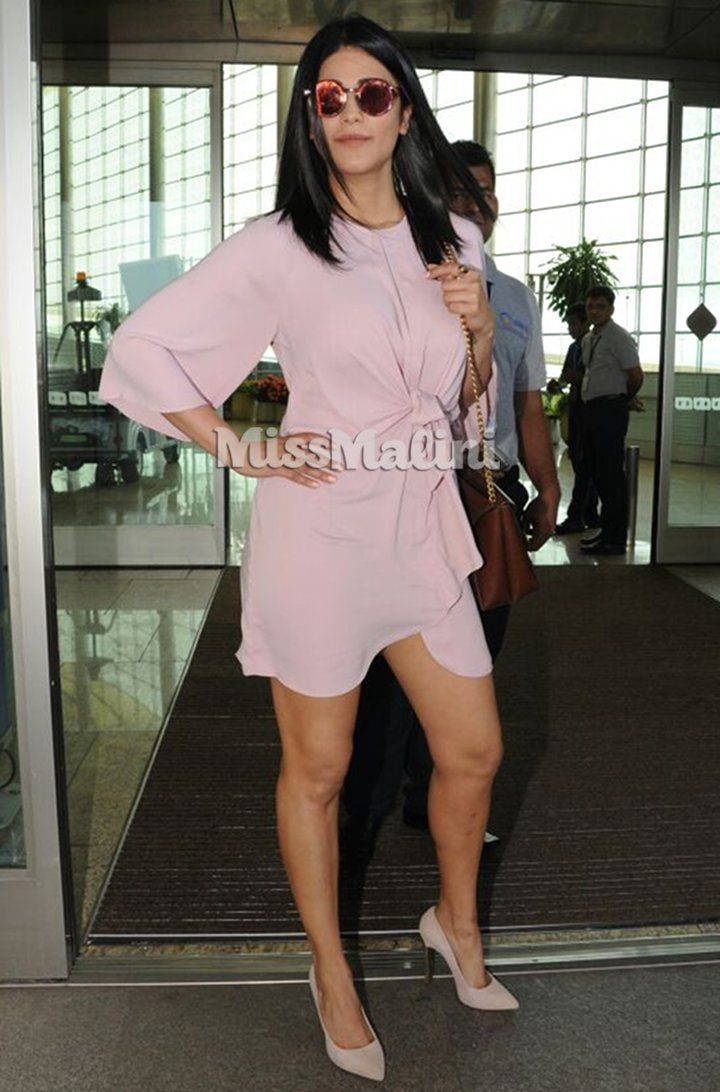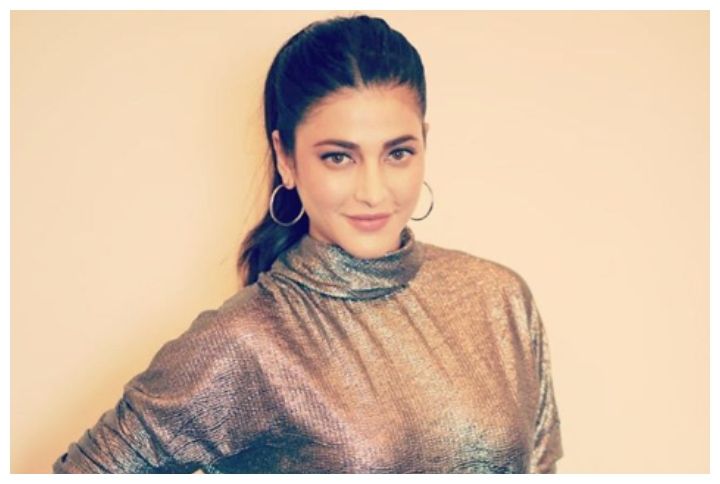
Shruti Haasan is an actress who has been prominent in the Tamil, Telegu and Hindi film industries and has juggled all three industries at once rather successfully. Coming from a family where both her parents – Kamal Haasan and Sarika – are accomplished actors in their own right, she had huge names and reputations to shoulder. She has won Filmfare Awards for her debut performances in Tamil and Telegu and has gone on to star in some critically acclaimed and commercially successful films like 7aum Arivu in Tamil, to Srimanthudu in Telegu to Gabbar is Back and D-day in Hindi. But, when it came to her one core passion in life, it was always music for Shruti. Having taken a break from acting for a while, Shruti concentrated on writing songs, producing music with artists in the UK and even performed live a few times on stage there. We caught up with the singer and actress and discussed her album, her love for live performances, her thoughts about the independent music scene in India and much more.
Excerpts:
Back in 2015 while interacting with your fans, you had mentioned about releasing your international album soon. It is finally happening, how would you sum up what you’re feeling?
Yes in 2015, 3 years ago. So I had started thinking about it then but it has taken a while. Also, I have to agree, this is exactly how I wanted it to be and it is with all the people I wanted to work with. I feel like it’s been 20 years in the making, so it is a super exciting thing for me.
Not that we don’t have singles and albums by singers here in India, but in Hollywood, it’s on a bigger scale and standalone from films. For a singer, that is the kind of exposure that will give their talent more recognition, do you agree?
Yes, I agree with you. We do have singers in India, we do have an alternate stream apart from Bollywood music, but I don’t think it’s anywhere near where it is supposed to be. I remember in the ’90s, independent music which was separate from film music, was big. You had huge stars like Lucky Ali, Alisha and Anaida (of Parvaneh fame), people who were probably better than a lot of film music. But, somewhere along the way it just got diluted and kind of vanished into thin air. As for me working on my English album, it was because of the fact that though I speak Hindi, Tamil and Telegu, I feel like I can express myself better in English. So where does that put an artist like me where do I get to express myself best? Because I find it easiest to communicate in English, I decided to go to London to make music with artists there, and there were no strategic reasons to it other than that, and it was not because I wanted to gain recognition of any sort. Having said that, India is so globalised and we have a huge percentage of the population that listens to English music here, so I’m just happy to have it reach everywhere.
As a musician, performing live and watching the reactions of your fans live is like the biggest high. How much do you enjoy live performances?
I think I have enjoyed being behind the screens and the camera, rehearsing with the musicians where we are three to five people in the room bouncing energies off of each other which is an amazing experience. And then you take that to your audience and see the fruits of your effort or not…which has not happened so far, Thank God! But, I feel the important thing is that you know you get the instant sense of energy from your audiences when you are on stage, you know which direction you are going in, whether it’s right or wrong, whether you are feeling enough, you know? Because only if you are, your audiences will also reciprocate. I loved that in all my performances in London, I have had like completely varied audiences, completely non-Indian audiences who have probably never heard a brown girl sing in English. It is really a lot of fun to perform live and it is probably my favourite thing to do.
Can you tell us something about your album?
So my album is very autobiographical, it is very internal and intimate and feminine in its energy, not in a girly way but in an unafraid, unabashed sense. It is an expression of the women of my age and what we are feeling, and I want to put that across. It has some songs that I had written long before, which I have restructured to how I feel now and there is stuff that we have created completely from scratch with my co-writers and other two musicians. All of it is my melodies and lyrics which is something that I am really happy about because it is so personal you know, putting it across in music in the same way I worded it in my head so it feels authentic to me. I have never thought about being liked by people or making my music sound a certain way to get more people to like it because that is just not worth it at the end of the day. We have all loved the stories behind the musicians we look up to, and that sense of soul is what I try to keep in my music as well.
How did you decide about the kind of emotions and feel the album will have?
So from the very beginning, I was very clear in my head that I wanted to talk about the internal dichotomies – the meaning of which has many layers to it. It can be about what it means to be a woman, what it means to be a person in a struggle with themselves, what it feels like when one personality is trying to dominate the other within yourself. I have also explored what it means to me to be from another race, to be mixing in the world of colour and gender. Also, about where I come from, and I don’t mean India but like what fame has meant to me, what art has meant to me and my family. None of the songs is whiny because fortunately, by this age, I have stopped whining. The music is more reflective and more pensive with a lot about good memories.
Have you had any crazy fan experiences during your gigs?
So I have had crazy fan experiences in India when we have gigged. Actually, it was really beautiful…it wasn’t crazy. In London, at Troubadour, I was really scared that the audiences might ask us to sing a Hindi or a Tamil song but they did not. They were so loving and accepting and they were like, “You do your thing, honey,” and that was great. So, there was one song that I had written in English, but the chorus of four words is in Tamil because it goes with the concept and feels authentic to the song. There was this lovely lady in the audience who was listening with so much interest and had like this proud mum face for the first 3-4 songs. Finally, when I came to the song I mentioned, and she heard the Tamil bit, I saw her crying! It may be because she suddenly heard her mother tongue after so long in a foreign country, but to think I must have moved her was amazing. I met her afterwards and she was really sweet. I felt that was a crazy moment for me because as a musician you live to move with what moved you.
You have been very selective about your projects in Bollywood. Are there specific roles that you want to play in your career?
I don’t think I have been selective on purpose. I may look like an extremely picky person on the outside, but the truth is that I have been balancing three careers between Tamil, Telegu and Hindi. I also do feel that sometimes, content-wise, I feel drawn towards content that is not necessarily in Hindi, not to mention the fact that I come from a more multi-cultural background and have grown up with many languages at home. For me, it is kind of about being a nomad actor more than being picky. Having said that, after being in the business for 10 years now, and taking this break now, I have realised I only want to commit myself to things I really wanted to do and am a 100% passionate about. In Hindi films too, there have been films that I really enjoyed working on, like D-Day and Behen Hogi Teri. But there also films that I did not enjoy because beyond a point it was not resonating with me and I felt like it was not fair to me or to the film. So in that case, if I am choosy, I’d rather be choosy than do something that I am not really committed to.

